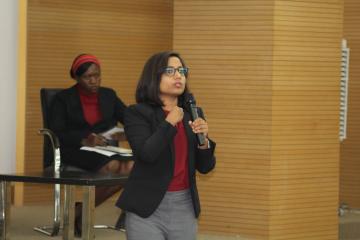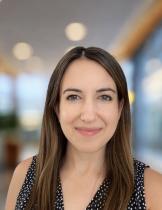
Juliette Seban, J-PAL ’12, on driving forward development innovation at France’s FID

The Alumni Spotlight series highlights J-PAL alumni who are making an impact across industries and around the world. To nominate a J-PAL alum to be featured in a future Alumni Spotlight, please fill out this form.
Juliette Seban is a former research manager at J-PAL Europe, where she managed several randomized evaluations while pursuing a PhD in development economics. Juliette is now the executive director of France’s new Fund for Innovation in Development (FID), which supports innovators and researchers efforts to test, accelerate, and scale the deployment of impactful solutions to reduce poverty and inequalities. She reflects on her PhD experience, her work at J-PAL and FID, and the importance of keeping fun at the heart of career decisions.
What drew you to this type of work?
I don't remember exactly when I chose to do development economics, but what I remember is that I’ve always wanted to do something useful. I decided to study economics in university because I thought it would be about real-world problems. But my early economics classes were very theoretical—I was not exactly passionate about it at first. It wasn’t until I realized that the tools we were learning could actually be applied to improve people's lives. That was a turning point for me.
After finishing my master’s in development economics at the Sorbonne University, I interned at the World Health Organization in Dominican Republic and then at the Center for Global Development (CGD) in Washington, DC. This is where I realized research could actually influence policy and decided to pursue a PhD.
Just before returning to Paris, a colleague at CGD told me that J-PAL was opening up a Europe office and that I should go check it out. As soon as I got back, I met with the team at J-PAL Europe and applied for a job as a part-time research assistant. This was early 2008, just shortly after the office had opened in late 2007—so I was privileged to be part of the very beginning of J-PAL in Europe.
You started as a research assistant at J-PAL, then were promoted to research manager. What was one of the most interesting things about your role, and what did you learn?
I can imagine many sharing the same experience when they’re asked this question: You’re doing one million different things, and that’s how you learn. You do research management, staff management, surveys, data analysis, planning and engaging with all kinds of stakeholders—there's a lot of different things that need to get done to conduct a successful impact evaluation. I really liked this diversity in tasks. The job was certainly never boring!
What I liked the most is that despite my rather young age, I was given a lot of responsibility. J-PAL Europe was a new and small office. So we all had to pitch in across the board to realize all these new projects. Researchers who were part of the team were also super engaged and committed to making it work. While it meant a lot of pressure for me at the time, it was also an incredible opportunity that allowed me to learn a lot and hone my research and management skills.
You started your PhD while working at J-PAL. What was that like?
I had seen researchers at CGD doing amazing research that had an impact on the world, and I decided to get a PhD so I could work in that space. I applied for a part-time research assistant job at J-PAL to give me something interesting and concrete to do while thinking about my PhD. And then I never left! Instead, I got a full time job with J-PAL.
I would never have finished my PhD if I had not simultaneously been working at J-PAL. My work experience at J-PAL very much informed my PhD research. And it gave me a fun, motivating, friendly environment to work in—I definitely needed that to do a PhD. I do not think I could have done a PhD solely in a university environment; it felt too constraining.
How has having a PhD helped your career?
I knew I did not want an academic career, but I knew that I wanted to work at the intersection of research and policy. I wouldn’t recommend a PhD for everyone, but I think having this degree allowed me to pro-actively and constructively engage with other researchers and work closely with them on numerous projects—it helps knowing how to ‘speak their language.’ To be clear: I don’t think it requires a PhD to do so, but in my case, I believe it helped me.
Let’s pivot a bit to your current role as executive director of France’s new Fund for Innovation in Development, or FID. What does FID do, and what in your view makes FID different from other innovation funds?
FID was inspired by other innovation funds, like USAID’s Development Innovation Ventures and the Global Innovation Fund, and so it has a lot in common with them. But there are two important distinctions.
The first one is that FID adds two stages to the typical “pilot, test, and scale” model. We have launched the first “Prepare Grant” in global innovation funding: a small amount (up to 50,000€) to support newer or more marginalized applicants who have not previously had access to funds like ours while they prepare a FID application. Prepare Grants can help answer key questions or build organizational capacity in the “idea stage” of an upcoming proposal. This step was missing in many other funds, so this is a signature of FID.
Another signature effort is our “Transforming Public Policy” grants. These can help governments institutionalize specific innovations or build their capacity to design, test and deploy rigorously evaluated innovations. In many cases, a relatively small but catalytic grant can support government/researcher partnerships working to institutionalize an evidence-supported innovation. We hope this will interest J-PAL affiliates who are already working with government partners to institutionalize evidence in policy, and we are working to spread the word of this opportunity!
These two additional types of grants should help in our mission of finding new actors who did not have access to these types of funds previously and in creating stronger partnerships with governments to transform public policies.
The second distinction is that FID is embedded within the French development agency, Agence Française de Développement (AFD). This means that we can “hit the ground running” with the ability to leverage AFD networks and grantmaking tools. We also have the opportunity to work closely with AFD priority countries and priority sectors. While we are open to applications for work in all LMICs and in all sectors, we believe these priorities and networks will help us reach countries that have less access to existing global innovation funding due to language barriers or other constraints.
What’s one of the most exciting or promising things about your work at FID?
I find starting something from scratch very exciting. It is very intense and challenging, and—like back in my early J-PAL time—I get to be involved in so many different things. This phase of creation offers so many opportunities. Now, I get to excite and motivate an entire team to proactively be part of the creation process. This is a new challenge for me but one that I am very glad to embark on.
What skills from your time at J-PAL have you found useful in your earlier roles and in your work at FID?
I think project management skills and communications skills have been and continue to be critical in my roles. At J-PAL and, later, at the International Rescue Committee, I took on a lot of project management responsibilities and interacted with different stakeholders. I had to learn how to be comfortable meeting with or presenting to high-level officials and much more experienced researchers than I was at the time. The stakeholders I was working with had very different backgrounds. Some understood quantitative research; some did not at all. This diversity has helped me learn how to navigate between those stakeholders and adjust my way of communicating to make sure we were all on the same page.
More generally, I’ve always worked at the intersection of research and policy. Being able to understand both languages and navigate between those two worlds has been extremely interesting and drives my focus to improve those connections with FID.
What I liked a lot about J-PAL was the level of rigor and the logic with which we approached impact evaluation—being very deliberate in considering questions like, “What are we looking at?” “What are we trying to change?” “What are the mechanisms, and what is the logic behind them?” It is a way of thinking about programs, policies, and challenges that’s very useful for my career to date.
What types of skills and background do you think are most valuable in people who are successful in these types of roles?
I think it’s useful to have a lot of different experiences, to change jobs. Try to gain experience navigating in different spheres—research, innovation, with the public as well as the private sector. Most of the people I hire on my team have multiple experiences in different sectors and roles, understand their logic and speak their languages. This is not quite a “hard skill,” but having experience with different work environments is a big asset.
What was the best advice you received early in your career?
The best advice I received, and the best advice I can give, is to choose something you enjoy. I think a J-PAL affiliate told me that. Early in my career, I had to choose between working at IRC in New York or working at a respected job in a French ministry, and the professor told me to go choose the exciting option—and he was so right. It’s easy to get caught up in having a career “strategy,” but if you’re bored in your job, it’s not worth it. So that would be my advice: Have fun!



